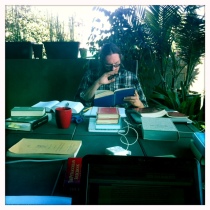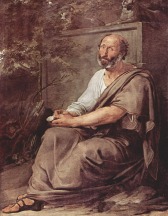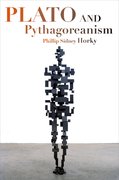What does the ‘work’ of philosophy look like…in Southern California?
Monte Ransome Johnson (UCSD) and I have been collaborating on an article-length translation, commentary, and critical essay on a fascinating but understudied document in the history of Pythagoreanism: the fragmentary treatise referred to as On Law and Justice (Περὶ νόμου καὶ δικαιοσύνης) and attributed to Archytas of Tarentum. We now believe that it should be considered a Hellenistic document, probably earlier than Cicero’s On Laws (50s BCE), but later than Chrysippus’ On Law (late 3rd Century BCE), the two works outside the Pseudo-Pythagorica with which it shows the greatest affinity. The author, who does not appear to be identifiable with the author/s of the other texts attributed to Pseudo-Archytas, was familiar with Aristotle’s works, especially Politics and Nicomachean Ethics, with which he takes issue (in his promotion of a ‘democratic’ mixed constitution). His strongest affinities appear to be with Stoicism – a point not often made with regard to the text – but he also exhibits quite a number of Platonist tendencies as well, like Philo of Alexandria.
(Yes, that’s Monte hanging outside on the veranda on a perfect sunny day; the author is not pictured, but is also enjoying the weather and a fab cup of coffee.)




